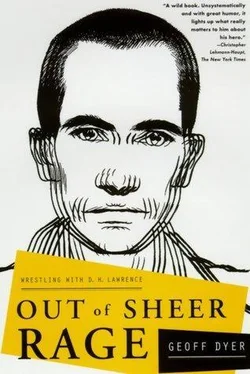Who knows, though: I may hate disappointment but perhaps I also long for it. Perhaps it is not luxury doughnuts and cornetti integrali I want but the experience of being denied these things I think I want. Would I be so determined to have my luxury doughnut or my cornetto integrale every day if I knew there would always be a surplus of luxury doughnuts and cornetti integrali ? Or have I made up my mind that I must have one of these luxury doughnuts (exceptional value, incidentally, at 35p) or cornetti integrali each day precisely because there is a good chance that they will not be available? Perhaps what I want, in other words, is actually not a luxury doughnut or a cornetto integrale but the chance to consummate my disappointment, to experience what I most dread which is actually not going doughnut-and cornetto -less through the day but which is, precisely, experiencing disappointment. Who knows? How can one know these things? All I do know is that for whatever reason I must have a doughnut or a cornetto integrale for elevenses and very frequently there are no doughnuts or cornetti integrali left and at those moments I would gladly take my head and dash my brains out on the shop window just to gain a brief respite from the pain that is exploding within it.
The idea behind this obsessive monitoring of all the things that enrage me is that eventually I’ll become punch-drunk with annoyance. At the moment I’m in a state of exasperated exasperation, self-generating irritation, ever-increasing anger. Things annoy me now which I wouldn’t even be aware of were it not for the fact that I’ve decided to keep a tab of things so strictly. I’m currently in a hyper-volatile condition but at some point there must come an exhaustion which is very like peace. I’ll wear myself out, be so depleted by anger that I won’t even have the energy to get agitated. My rage will blow itself out and I’ll never raise my voice again. I’ll be serene as a windless afternoon — and I got this idea, sort of, from Lawrence.
Jam-making, book-keeping and debt-paying aside, you see, what I like most about Lawrence is his temper. Not the famous, record-breaking rucks with Frieda but his day-to-day capacity for annoyance, his inexhaustible irritability. His masterpiece in this respect is a letter to Earl Brewster of 1921. ‘No, I don’t understand a bit what you mean about rightness and about relationships and about the world,’ he begins. ‘Damn the world, anyhow. And I hate “understanding” people, and I hate more still to be understood. Damn understanding more than anything. I refuse to understand you. Therefore you can say what you like, without a qualm, and never bother to alter it. I shan’t understand.’
From this mild beginning Lawrence proceeds to work himself up into a fury about anything and everything. He has, we learn, ‘been in a hell of a temper for three weeks’. In that time he has ‘written such very spiteful letters to everybody that now the postman never comes’. It is as if the contents of the letter were so spiteful that the postman himself took offence. Now even Larkin didn’t get that grouchy! And Van Gogh, he had the postman to keep him company at Arles!
At one point in the letter Lawrence’s anger reaches such a pitch of fury that he abandons language and spits ink at his long-suffering friend: ‘Pfui! — pish, pshaw, prrr!’ After that, in more conciliatory spirit he asks Brewster: ‘So, what’s it like in Ceylon?’ A rhetorical question if ever there was one, for as far as Lawrence is concerned he ‘would rather go to Mars or the Moon. But Ceylon if there’s nothing better. Is everybody there as beshitten there as here? I’ll bet they are. There isn’t any news, so don’t ask for any.’
Lawrence was in Taormina at the time, a place he liked a great deal, more than almost any other — but one of Lawrence’s enduring pleasures was to rant on about the awfulness of wherever he happened to be. Perhaps this is why Italy held such a special place in his affections: it provided constant fuel for his temper: ‘I feel my summer travels didn’t do much more than put me in a perfect fury with everything. But then that’s the effect most things have on me. The older I get, the angrier I become, generally. And Italy is a country to keep you in a temper from day to day: the people, I mean.’
This is from another of the bad-tempered letters he had mentioned to Brewster. Four months later, after much prevaricating about going to America he reneged on his earlier preference for the moon or Mars and went to meet the Brewsters in Ceylon. It was a place with: ‘marvellous air, marvellous sun and sky — strange, vast empty country — hoary unending “bush” with a pre-primeval ghost in it — apples ripe and good, also pears. . but — But — BUT — Well, it’s always an anti-climax of buts. — I just don’t want to stay, that’s all. . But I love trying things and discovering how I hate them.’
Dispatched a decade earlier, another letter expresses this familiar mood of self-generating exasperation. ‘If all goes well I shall probably stay here till the spring, although neither the house nor the climate really agrees with me: this perpetual alternation between bora and sirocco is no good for the nerves, and I exhaust myself by enduring first one and then the other.’
The place in question was the Castle Duino and the author of this authentically Lawrentian moan was Rainer Maria Rilke. Rilke stayed in many of the same places as Lawrence and the overlaps of itinerary and tone alert us to the way that Lawrence’s letters — and Larkin’s too, perhaps — place him in the European tradition of the literature of neurasthenia, of anxiety, fretting, complaint. This tradition — more accurately, this strain — culminates in Thomas Bernhard, the Austrian writer who dedicated book after book to an exhaustive and exhausting catalogue of what Lawrence, writing (appropriately enough) from Austria, termed, ‘the life-exhaustion feeling’. This life-exhaustion feeling in Lawrence is actually very close to that life-affirming quality that he is usually admired for. Likewise, he may have inveighed against America for the way that there was ‘no life of the blood’, only ‘nerves, nerve-vibration, nerve-irritation’ but Lawrence’s famous faith in the religion of the blood often seems a disposition of the nerves.
The resemblance between Lawrence’s nerve-irritation, as revealed in his letters and Bernhard’s fictional neurasthenic rambling, is as striking as it is, at first, surprising. Lawrence shares with Bernhard’s narrators the same chronic prevarication (‘Suddenly that I am on the point of coming to America I feel I can’t come’), intermittently, at least, the same wild misanthropy, the same loathing of their country and countrymen. Both writers display the same abrupt surges and reversals of intent, the perpetual rages that accentuate the ill health — another shared theme — by which they are, in part, generated. Both suffered badly with their lungs and in both there is the same frayed-nerve, end-of-the-tether quality. Some of the classic Bernhard riffs — berating the world for exactly the characteristics he is displaying in the course of his tirades, for example — are prefigured in Lawrence who declared in 1929 that he hated ‘people who rave with unreasonable antipathies’. My favourite example is when he denounces Robert Mountsier as ‘one of those irritating people who have generalised detestations’. O ne of those . .
Many of the places in Lawrence’s Sardinia sound uncannily like those towns in Austria that elicit Bernhard’s ire. Mandas, for example, a place where, according to some people Lawrence meets, ‘one does nothing. At Mandas one goes to bed when it’s dark, like a chicken. At Mandas one walks down the road like a pig that is going nowhere. At Mandas a goat understands more than the inhabitants understand. At Mandas. .’ At Mandas even the inn is authentically Bernhardian:
Читать дальше












